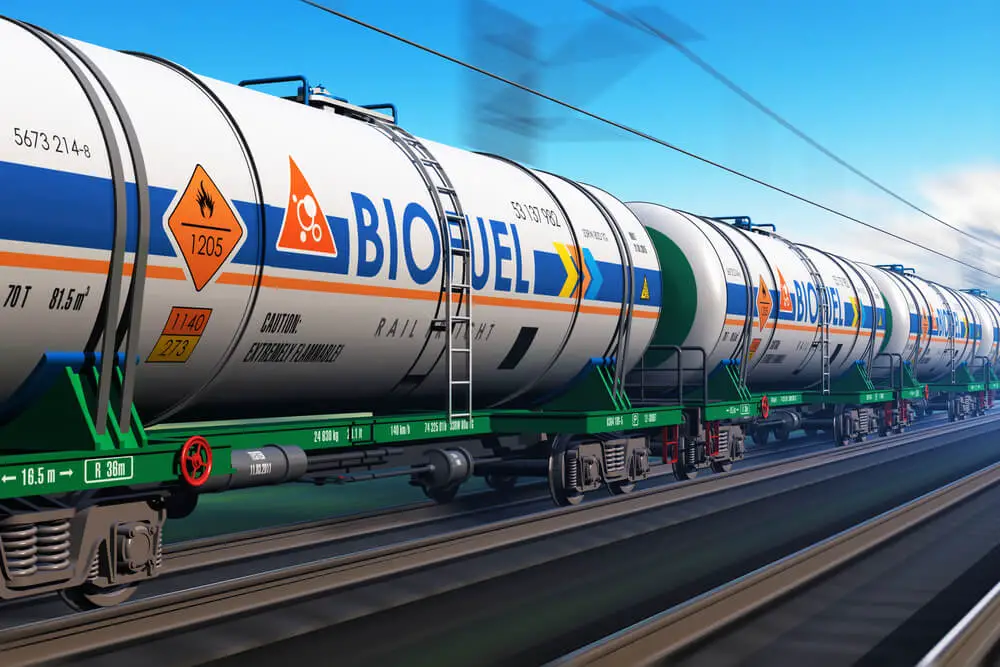In the past years, there’s been a fueling debate over whether biodiesel or Ethanol is the preferred source of energy of the future.
Eco-conscious investors are even wondering which alternative fuel they should tie their horses to as well.
With all the worry about the rapid increase of pollutants in the atmosphere, scientists have established a solution to curb this problem.
Most argue that the viable solution comes in the form of biodiesel and Ethanol.
Let’s understand the difference between Ethanol vs biodiesel.
What is the Difference Between Ethanol and Biodiesel?
As we know, most energy experts are focusing on biofuels, especially the two common ones – Ethanol and biodiesel. In simple words, both are non-petroleum-based fuels.
However, they differ significantly in how
they’re
- used
- made, and
- their impact on the environment
Let’s understand each biofuel first;
Ethanol
Most gasoline used in all-gasoline-powered vehicles contains around 10% ethanol.
Harnessed or produced using biomass energy, Ethanol accommodates many applications.
In the US, Ethanol comes from sugarcane or soybeans.
Cellulosic Ethanol, an advanced version, comes from non-food plant waste such as a corn stover.
Other countries use other organic materials and plants like sunflower, biomass algae, and rapeseed to produce these fuels.
Properties of Ethanol include;
- It’s flammable
- Renewable form of fuel made from plants
- Emits little harmful gas than petrol does
- Biodegradable, hence an earth-friendly fuel
- Used in petrol engines
Today, manufacturers mix Ethanol with regular gasoline to attain high gas’ octane levels. This simply means that the fuel will be cleaner as it burns.
Note that not all vehicle engines support ethanol fuel.
Many vehicles on the road today will handle a mix of as low as 10 percent.
Ethanol represents 10 percent of the US gasoline fuel supply and is mainly derived from domestic sources.
On the other hand, some vehicles can run on 100% ethanol, but they must be flexible-fuel cars.
Biodiesel
Biodiesel helps cut down on harmful emissions as there’s less reliance on traditional fossil fuels than before.
Experts argue that the benefits of biodiesel have a positive impact on the planet and people than those of other fuels.
The raw materials used to make biodiesel include; vegetable oils and animal fats. It’s therefore produced from renewable resources through a process known as transesterification.
Its properties include:
- Made from sustainable raw materials
- It’s non-toxic and biodegradable
- It’s a pure product
- Emits fewer pollutants than petroleum fuel
- Simple to use
- Free from aromatic and sulfur compounds
Biodiesel burns cleanly, and that’s why it’s used in diesel engines. The compound will cause little to no harm to the environment.
In summary, these are the differences between Ethanol and biodiesel:
- Biodiesel comes from soybeans, while Ethanol is from grasses, corn, and other agricultural wastes
- Biodiesel belongs to the ester group, while Ethanol belongs to the alcohol group
- Ethanol causes more harm to the planet (friendlier) than biodiesel
- Ethanol generates less energy than biodiesel (biodiesel is more efficient than Ethanol)
- While Ethanol is blended with other gases like gasoline to enhance its compatibility, biodiesel can be a standalone fuel that can run in any diesel-engine vehicle.
Ethanol and Biodiesel Similarities
The invention of Ethanol and biodiesel is a new dawn in the present world.
Apart from solving the energy crisis problem, they also cause minimum environmental harm.
Better still, the use of alternative energy sources reconciles the need to slow down global warming yet expand energy supplies.
Indeed, biomass power reduces harmful pollution by 45 percent over regular fossil fuels.
- Both Ethanol and biodiesel are non-petroleum based fuels (created with biomass materials)
- They’ve wide applications in the automobile industry – used in car engines without modification.
- Biofuels provide the solution to an energy crisis
- Biodiesel and Ethanol are eco-alternatives to fossil fuels
- Both reduce greenhouse gas emissions and pollution
Recently, biofuels have gotten media and political attention since they meet a good percentage of diesel demand and replace the use of gasoline.
Is Ethanol A Biodiesel?
No. Ethanol is made from biomass.
So, it’s a renewable biofuel. Ethanol belongs to the alcohol group and is produced from corn, sugarcane, and other agricultural waste.
Unlike biodiesel, it acts as an additive in gasoline.
On the other hand, biodiesel comes from natural oils like animal fats and soybean.
It’s a cleaner fuel that replaces petroleum-based diesel fuel.
What is Ethanol and Biodiesel Used For?
These biofuels are eco-substitutes for diesel fuel, but they have many other applications.
Alongside transportation, biofuels can provide clean-up oil, hydrogen, or cooking oil, to mention but a few.
For instance, Ethanol is usually blended with gasoline, heating oil, or diesel fuel in engines. Here are the common uses for Ethanol:
- In spark-ignition engines
- Used in drinks
- Manufacturing of cosmetics, plastics, paints, lacquers, and plasticizers
- Feedstock for the chemical industry
Biodiesel is used in:
- Transportation industry as a vehicle fuel
- Provides heat
- Energy generation
- Removing paint and adhesive
- Cleaning oil spills and grease
- Cooking
Biofuels Vs Fossil Fuels Environmental Impact
Biofuels and fossil fuels differ in their environmental impacts.
Biofuels are carbon neutral as they’re harnessed from biomass.
Growing biofuel crops reduces carbon emissions to the atmosphere.
This means that biofuels like Ethanol and biodiesel will reduce GHG emissions than fossil fuels will do.
Fossil fuels release carbon that has been in store for thousands of years.
So, expect air pollution, harmful greenhouse gases that lead to global warming and climate change.
Developed countries prefer biofuel because it burns cleaner than fossil fuels.
The usage tends to eliminate some air pollutants that would otherwise result in fossil fuels.
Is Ethanol Cheaper Than Biodiesel?
No. Ethanol is more expensive than the rest.
Although eco-consumers would prefer a fuel that has less impact on the environment, most are price sensitive.
The good news is that many governments are in support of the growth of biofuels.
Through tax credits and subsidies, the price of Ethanol and biodiesel now appear less expensive.
Despite all this, oil is still cheaper than both Ethanol and biodiesel simply because of energy density, Mother Nature, and time.
Conclusion
The rise of biofuels seems to come with lots of benefits as they’re made from biomass materials.
While we use biofuels such as Ethanol and biodiesel in our car engines, we reduce the carbon emissions to the atmosphere.






